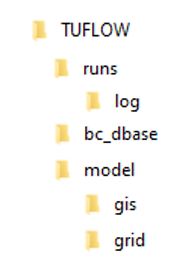Difference between revisions of "XPSWMM Conversion TUFLOW Structure"
Jump to navigation
Jump to search
Chris Huxley (talk | contribs) |
|||
| Line 30: | Line 30: | ||
<br> | <br> | ||
| − | To simplify the process of converting the XPSWMM model to the recommended TUFLOW SWMM folder structure, we have created a processing tool. This tool | + | To simplify the process of converting the XPSWMM model to the recommended TUFLOW SWMM folder structure, we have created a processing tool. This tool does the following: * Converts the GIS format written by XPSWMM (mif/mid) into a more user friendly GeoPackage Database format |
| + | *Creates the recommended TUFLOW folder structure; and | ||
| + | *saves the converted model files to their correct locations. | ||
| + | For more information on the processing tool, see <u>[[Convert_TUFLOW_Model_GIS_Format | Convert TUFLOW Model GIS Format]]</u>. | ||
<ol> | <ol> | ||
Revision as of 08:56, 16 February 2024
Convert XPSWMM Model to Recommended TUFLOW Structure
When XPSWMM writes its TUFLOW files, it consolidates all the information into a single folder (typically the 2D\Data folder). This is not a standard TUFLOW structure. The standard structure used by the majority of TUFLOW modelers globally includes the following subfolders:
To simplify the process of converting the XPSWMM model to the recommended TUFLOW SWMM folder structure, we have created a processing tool. This tool does the following: * Converts the GIS format written by XPSWMM (mif/mid) into a more user friendly GeoPackage Database format
- Creates the recommended TUFLOW folder structure; and
- saves the converted model files to their correct locations.
For more information on the processing tool, see Convert TUFLOW Model GIS Format.
- Open QGIS. If you do not have QGIS installed:
- Install QGIS 3.34 or later: Latest 64-bit version of QGIS.
- Install the QGIS TUFLOW Plugin by following the instructions, QGIS TUFLOW Plugin Installation.
- In QGIS, go to Processing > Toolbox from the top dropdown menu options to open the Processing Toolbox.
- Go to 'TUFLOW' in the processing tool list and select 'Convert TUFLOW Model GIS Format'. This opens the dialog shown below.
- TCF: Click '...' and navigate to the XPSWMM .tcf. This should be located in the 2D\Data folder.
- Output Vector Format: 'GPKG'
- Output Raster Format: 'GTIFF'
- Output Profile: Any option can be used. 'ALL IN ONE' is used in this example for model design consistency with the TUFLOW SWMM Tutorials.
- Output Folder: Click '...' and navigate to an appropriate location to save your TUFLOW model. In this location, create a new folder called TUFLOW and select it.
- Advanced Parameters:
- Tick on 'Write empty files'.
- Output CRS: Select an appropriate Coordinate Reference System (CRS) for the model.
- Tick on 'Force TUFLOW Directory Structure'.
- TUFLOW Directory Structure Settings: Click '...'. Under 'Folder Structure', click the
 icon to add a folder. Set 'Key' to swmm, and 'Path' to ./model/swmm.
icon to add a folder. Set 'Key' to swmm, and 'Path' to ./model/swmm.
- Click 'Run'. Once the tool is finished, click 'Close'.
- Inspect the tool output to familiarize yourself with the TUFLOW model structure.
| Up |
|---|
